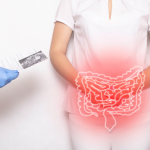What is the urinary tract?
The parts of the body that produce, store and remove urine (wee) are known as the body’s urinary tract. The main organs include the kidneys, the ureters and the bladder.
The kidneys
Your kidneys are 2 bean-shaped organs situated in the back of your abdomen, below your ribs. Their main job is to filter your blood to remove waste products and excess fluids from your body. They do this by producing urine. They also play several other important roles in keeping you healthy, including:
- helping to keep your blood pressure stable
- maintaining a healthy balance between salt and water in your body
- helping to keep your bones strong
- keeping your haemoglobin steady to help prevent you getting anaemia
The ureters
The urine produced by your kidneys then passes through the ureters, which are tubes connecting the kidneys and bladder.
The bladder
Your bladder stores the urine until you have the urge to urinate (do a wee). When you urinate, your urine passes from your bladder, through another tube called the urethra and out of your body.
What common problems can affect the urinary system?
Sometimes, part of the urinary tract can become infected. This is usually caused by bacteria that enter through the urethra, or more rarely, through the bloodstream. Urinary tract infections (known as UTIs) are common, and females are more likely to get a UTI than males. UTIs are also common in babies and in older people. Different types of UTI affect different parts of your urinary tract.
What are the different types of lower UTIs, and what are the symptoms?
If you have an infection that only affects your lower urinary tract you may have urethritis, (when only the urethra is affected), or cystitis (when the bladder lining also becomes inflamed).
Cystitis
Cystitis is a common type of UTI. Your symptoms may include:
- pain or stinging when you urinate
- pain in the lower part of your stomach
- passing urine more often than normal, but only passing a few drops
- urine that is cloudy or smells unusual
If your child has a lower UTI they may wet the bed at night, or accidentally wet their pants in the day.
Kidney infection (pyelonephritis)
If the infection moves up your ureters and your kidneys are also affected, you may develop pyelonephritis. Symptoms of pyelonephritis include high fever,back pain, diarrhoea and vomiting.
If you have these symptoms, it is important to see your doctor. If a kidney infection is left untreated, it can lead to kidney damage and other complications.
Kidney stones
Kidney stones are one of the most common urinary tract disorders. Your risk of developing kidney stones increases as you get older, especially if you have a family history of kidney stones.
If you have a kidney stone, you may feel sharp pains in the side of your back below your ribs, which may spread round to your front. You may have other symptoms including blood in your urine, nausea, vomiting and a feeling of urgency to urinate.
If you have these symptoms, it is important to see your doctor.
How can I look after my urinary tract?
To help maintain a healthy urinary tract:
- Drink plenty of water each day, unless you have a medical condition which means this is not possible. This can help reduce your risk of kidney stones and of UTIs.
- Go to the toilet as soon as you feel the need to urinate, rather than holding it in.
- After urination, females should wipe front to back to help prevent infections.
- Urinate before and after sex.
- Make sure you treat constipation quickly. Being constipated can increase your chances of developing a urinary tract infection.
- Ensure you eat a healthy diet.
- Wash your genitals every day and before having sex.
- Use only a mild soap and make sure you wash this off thoroughly.


